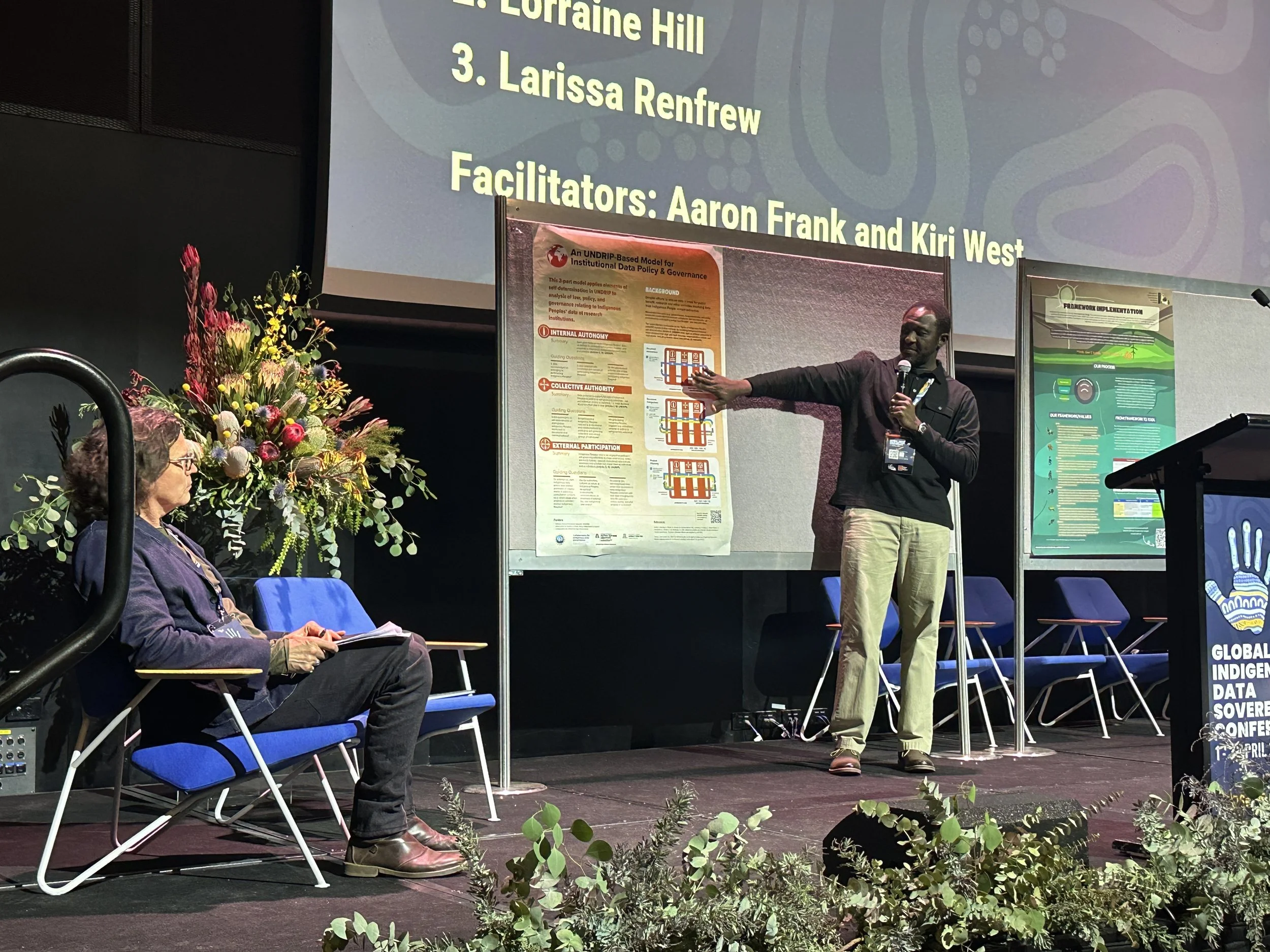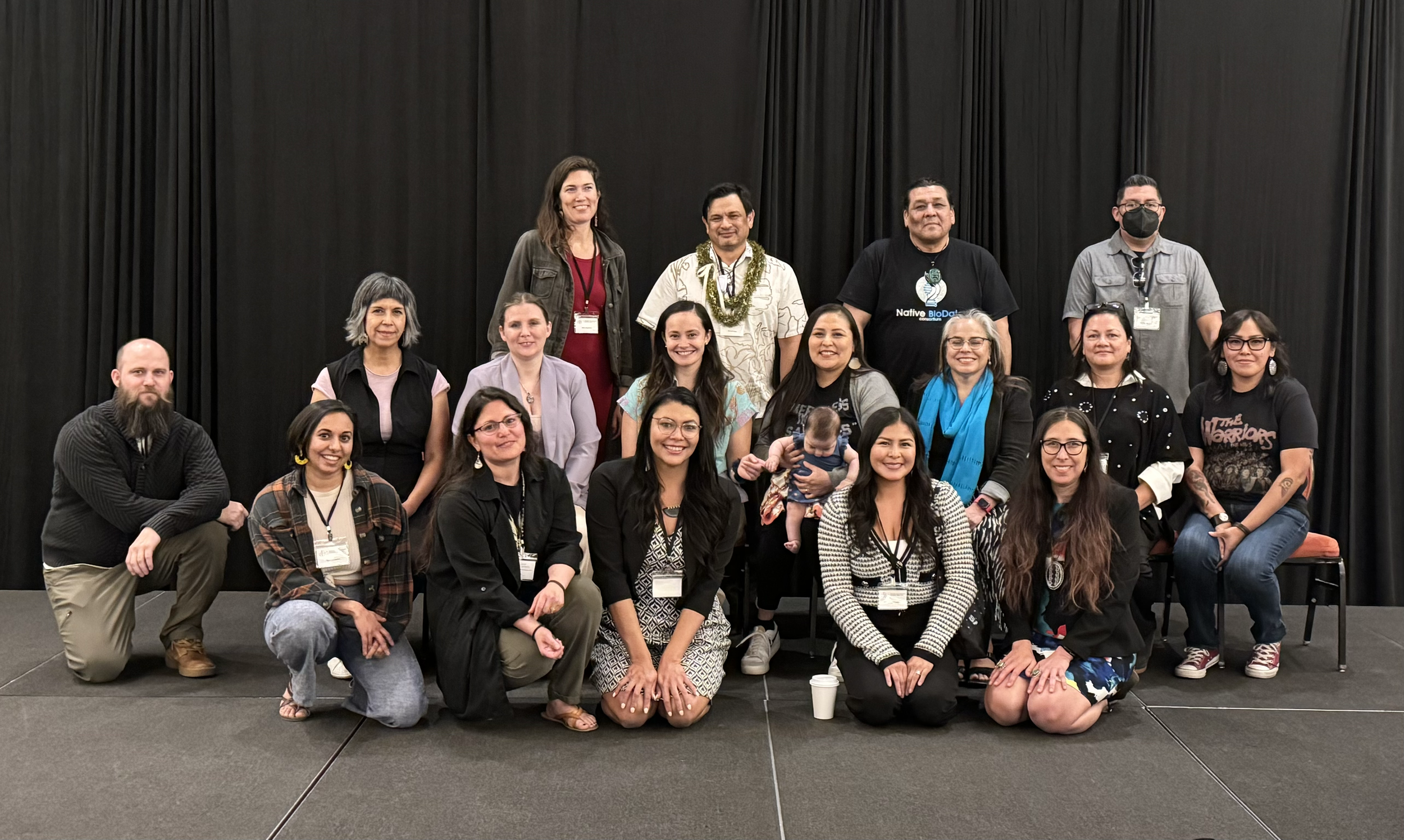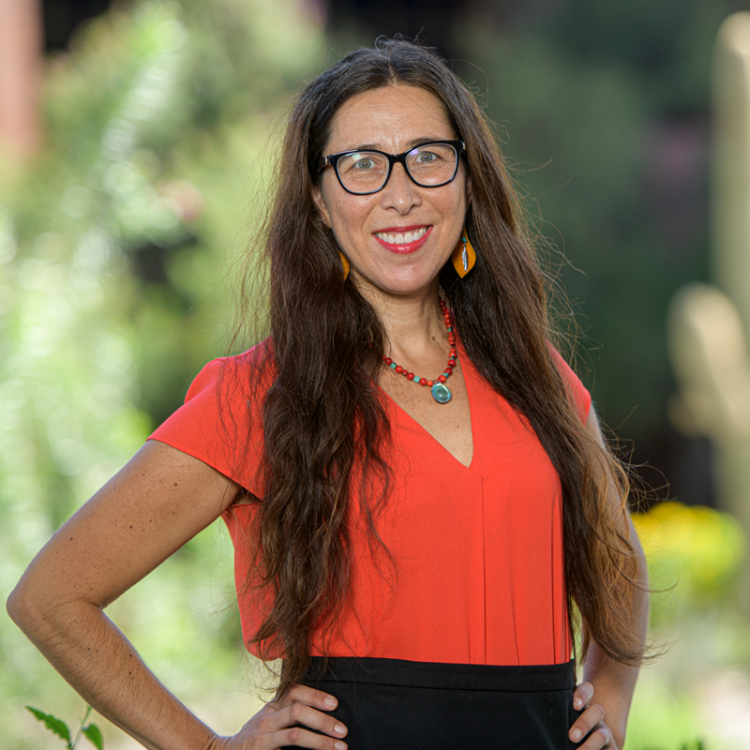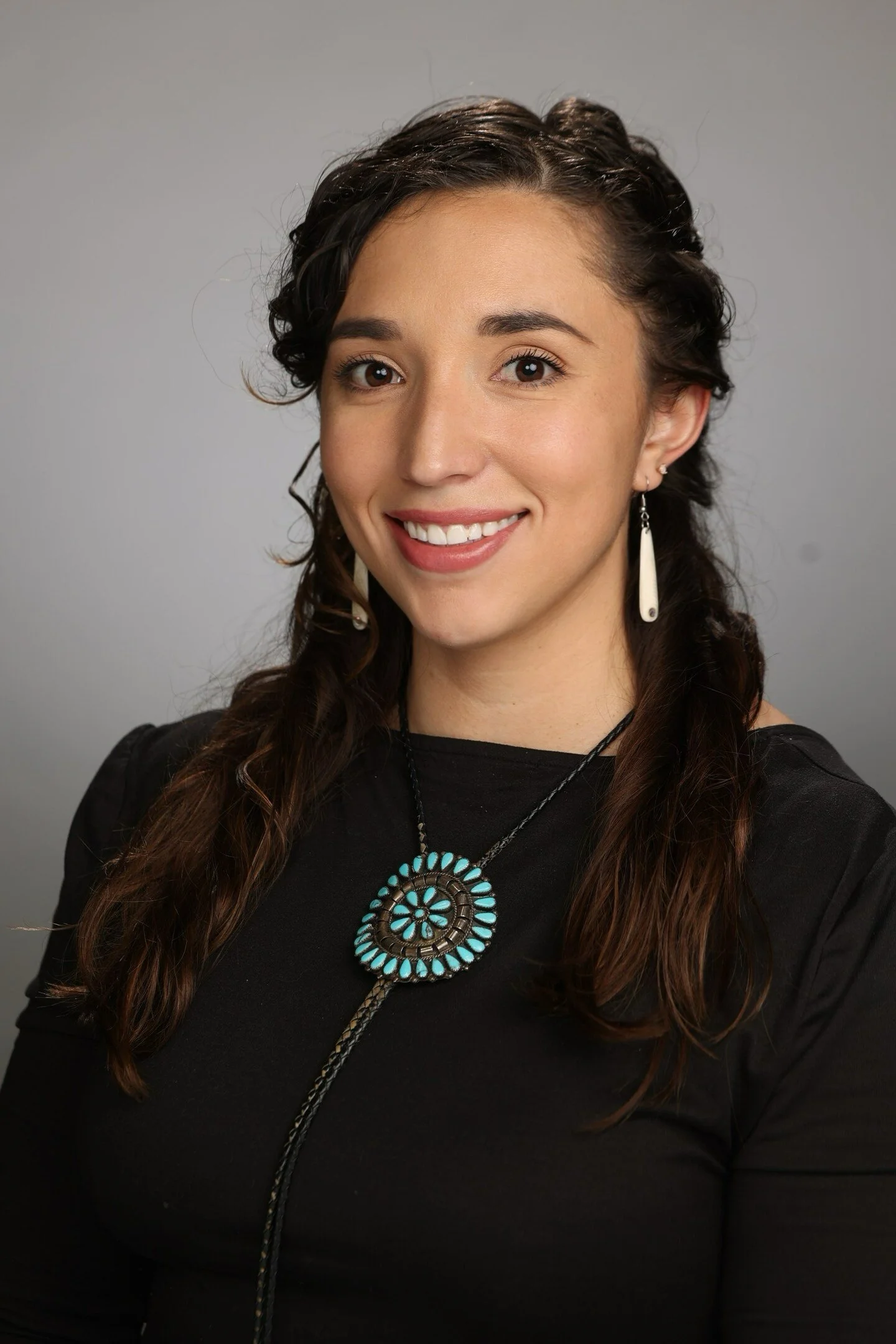
Indigenous Data Champions
Fellowship Program
An Indigenous Data Sovereignty & Data Governance Training Program for Indigenous leaders, professionals, and community representatives working on behalf of Tribal Nations, Alaska Native communities, Native Hawaiians, and Indigenous Island Territories.*
2025/26 FELLOWSHIP DATES: November 2025 – June 2026
-

About the Fellowship
The Indigenous Data Champions Fellowship aims to equip a cohort of 20 Indigenous leaders annually with the knowledge, tools, and relationships necessary to enhance Indigenous Data Sovereignty (IDSov) and Governance (IDGov) within their communities. Fellows will participate in monthly cohort calls, engage in specialized training, and attend the U.S. Indigenous Data Sovereignty Network (USIDSN) 2026 Summit, “Coming Home: Indigenous Data Governance By Us For Us.”
The program is led by Indigenous Data Alliance experts Dr. Stephanie Russo Carroll, Dr. Desi Small-Rodriguez, and Dr. Riley Taitingfong in collaboration with the Indigenous Peoples Data Collective (IPDC) leadership, Mari Hulbutta, Leece Oliver LaRue, and Hannah-Marie Ladd.
Each Fellow will demonstrate a commitment to exercising IDSov and IDGov in their respective community or communities by enacting culturally-grounded, community-wise data and knowledge practices. Fellows will share these ongoing and developing strategies in collaborative engagements with other fellows, Indigenous communities, and USIDSN partners. Fellows will also be given space to engage with USIDSN leadership, IPDC, and the Indigenous Data Sovereignty and Ethics Training (Indigenous DataSET) Fellows. The program aims to fill knowledge gaps in the ethics, governance, and infrastructure for research and data use that directly impacts Indigenous rights holders, ensuring that future science and data practices are more equitable, community-driven, and aligned with Indigenous sovereignty. Fellows will be awarded a stipend for their participation.
-
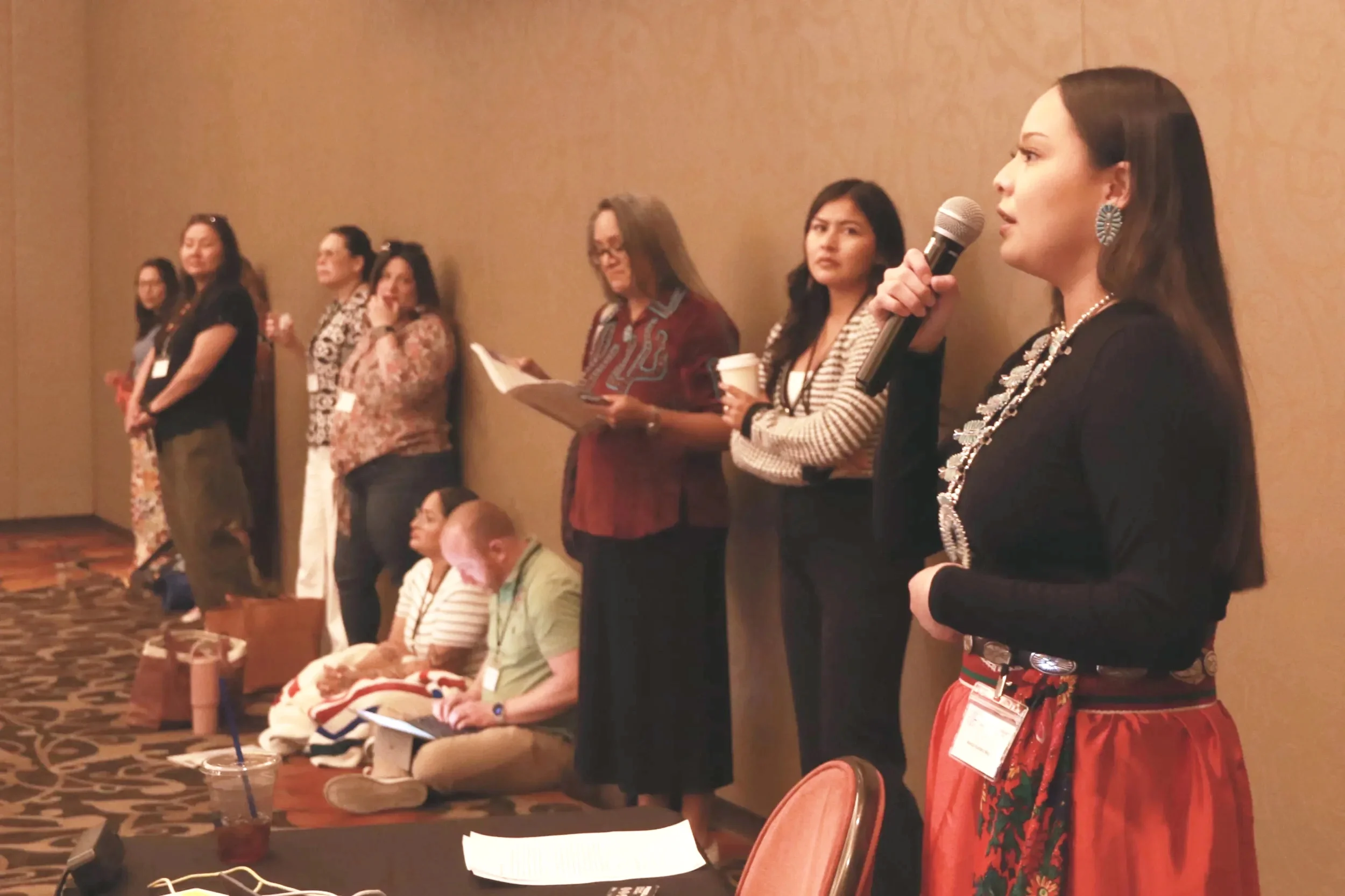
Authority to Activation Framework
The powers of IDSov and IDGov lie within Indigenous communities as they exercise their inherent right to self-determination over their data. Since 2015 the USIDSN, the Collaboratory for Indigenous Data Governance, and the Data Warriors Lab have been working together to advance the IDSov movement across the United States. With more than a decade of institutional advocacy and community partnerships, we now seek to establish the “Authority to Activation Framework” as the next step in growing the IDSov movement. This new Framework brings together Indigenous leaders (the ‘authority’) with Indigenous data technicians and scholars (the 'activation’) to expand the growth of IDGov within Indigenous and Tribal communities.
To formally launch the ‘authority’ arm, we have created a program called the Indigenous Peoples’ Data Collective (IPDC) to train and network Indigenous Peoples and Tribal Nations as they create policies, procedures, laws, and infrastructure to exercise IDSov. The Luce Indigenous Data Champions Fellows Program is the first of these opportunities and designed as a year-long fellowship equipping and supporting Indigenous leaders, professionals, and community representatives as they carry this movement forward within their own Nations and regions.
-
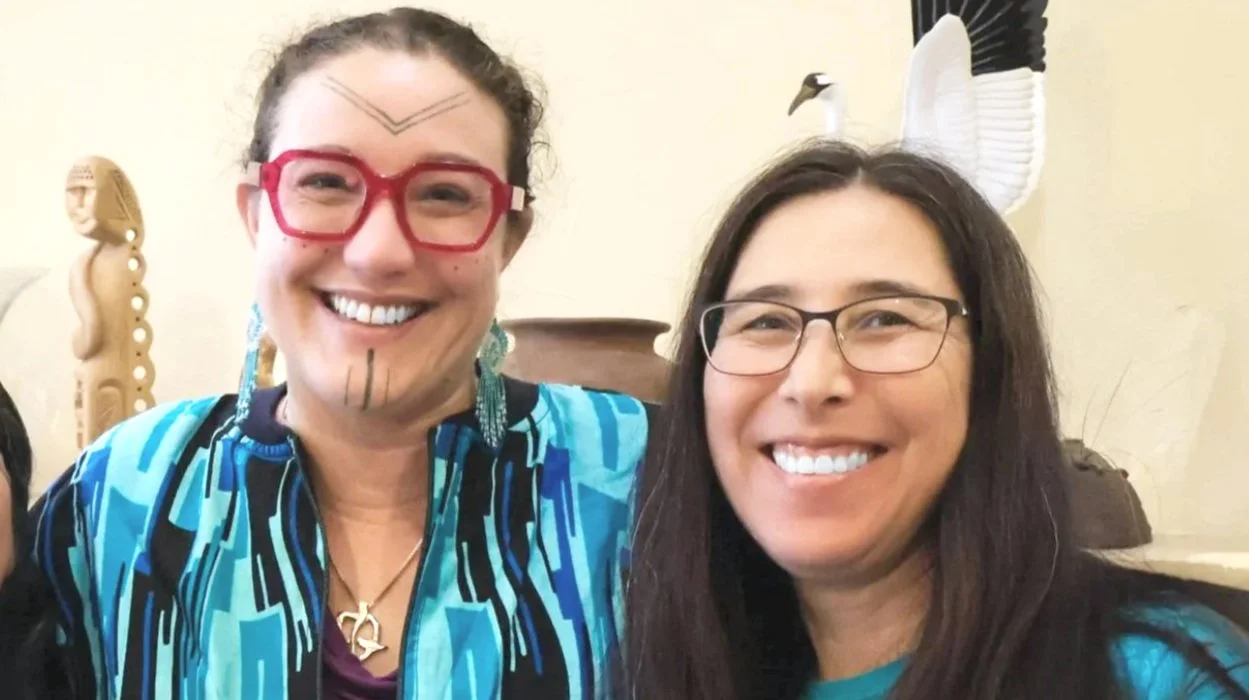
Who Should Apply
The Indigenous Data Champions Fellowship is open to individuals who fulfill the following criteria and roles:
RELATIONS
Indigenous individuals with Tribal, Alaska Native, Native Hawaiian, or Indigenous Island Territory affiliation(s); e.g., Puerto Rico, Guam, American Samoa, Northern Mariana Islands, US Virgin Islands. Applicants must indicate their Indigenous affiliation(s).
ROLES
Applicants should be working for or on behalf of Indigenous communities in one of the following capacities:
1. Tribal Institutions
» Tribal government leaders
» Non-elected/appointed/executive Tribal staff or employees2. Tribal, Alaska Native, Native Hawaiian, or Indigenous Island Territory Organizations
» Executive, department, and program leaders of nonprofit organizations directly serving Tribal Nations, Alaska Native communities, Native Hawaiians or Indigenous Island Territories.
3. Tribal or Indigenous Community-based roles:
» Community representatives
» Cultural leaders
» Tribal staff, Indigenous leaders, professionals, and community representativesMore details in application section below
WHAT FELLOWS WILL GAIN
Knowledge & Skills: Foundational and advanced training in IDSov and IDGov. Fellows will have the opportunity to attend sessions not open to the public on topics such as data sharing agreements, research ethics, community protocols, artificial intelligence, and data infrastructure.
Community & Kinship: Join a learning cohort with guidance from leading IDSov experts, opportunities for peer exchange, and mentorship from Indigenous DataSET Fellows who bring experience from the “activation” side of the Authority to Activation Framework.
Leadership Opportunities: Contribute to the development of real-world resources such as IPDC case studies, webinars, and technical assistance guides that will be shared with Tribal Nations and Indigenous communities across the U.S.
National Visibility: Represent your community at the April 2026 U.S. Indigenous Data Sovereignty Network Summit in Tucson, Arizona, where you will deepen relationships, present your insights, connect with Indigenous leaders nationwide, and expand your professional network.
Ongoing Impact: Design strategies during the fellowship to bring new practices home, ensuring what you learn is applied to governance, policy, research, or community development in ways that create lasting benefit for generations to come.
Fellowship Commitments
Fellows are expected to:
Engage in LearningParticipate in monthly cohort calls and monthly webinars/trainings from November 2025 to June 2026. Sessions are designed to build progressively on each other.
Contribute KnowledgeShare your learnings through at least one fellowship output (e.g., case study, webinar presentation, or resource for the IPDC knowledge base) so that your community and other Indigenous Nations can benefit
Attend the SummitTake part in the USIDSN 2026 IDSov + IDGov Summit (April 15–17, 2026 in Tucson, AZ), including opportunities to share your fellowship experiences. Support for travel expenses will be available.
Reflect & EvaluateComplete short pre- and post-fellowship surveys and reflection activities to strengthen the program for future cohorts and to help measure impact.
Stay ConnectedCommit to respectful communication and relationship-building with peers, mentors, and IPDC leadership throughout the fellowship year.
APPLICATION 2025/26
-
PROGRAM OVERVIEW
The Indigenous Data Champions Fellowship is a year-long program that equips 20 Indigenous leaders, professionals, and community representatives with the knowledge, tools, and relationships needed to strengthen Indigenous Data Sovereignty (IDSov) and Governance (IDGov) in their communities, as members of the first cohort of Foundation Indigenous Data Champions Fellows.
The Indigenous Data Champions Fellowship is open to:
RELATIONS
Indigenous individuals with Tribal, Alaska Native, Native Hawaiian, or Indigenous Island Territory affiliation(s); e.g., Puerto Rico, Guam, American Samoa, Northern Mariana Islands, US Virgin Islands. Applicants must indicate their Indigenous affiliation(s).
ROLES
Applicants should be working for or on behalf of Indigenous communities in one of the following capacities:
1. Tribal Institutions
» Tribal government leaders including elected leaders, appointed leaders, or executive-level staff of a Tribal Nation, Alaska Native Village, or Alaska Native Corporation.
» Non-elected/appointed/executive Tribal staff or employees serving in governance, administration, planning, research, museums, records/archives, IT, or data-related roles for their Nation or community. Includes Tribal Historical Preservation Officers and other Tribal administrators of federal and state tribal/Indian laws, regulations, and statutes
2. Tribal, Alaska Native, Native Hawaiian, or Indigenous Island Territory Organizations
» Executive, department, and program leaders of nonprofit organizations directly serving Tribal Nations, Alaska Native communities, Native Hawaiians or Indigenous Island Territories.
3. Tribal or Indigenous Community-based roles:
» Community representatives: individuals recognized by their community for contributions to governance, stewardship, or data-related projects.
» Cultural leaders: individuals who hold responsibilities over the governance of ceremonial and/or cultural knowledge within an Indigenous community.
» Tribal staff, Indigenous leaders, professionals, and community representatives, including those with little or no prior exposure to Indigenous Data Sovereignty (IDSov) or Indigenous Data Governance (IDGov), are invited to apply to participate in the 2025–26 fellowship cohort.
-
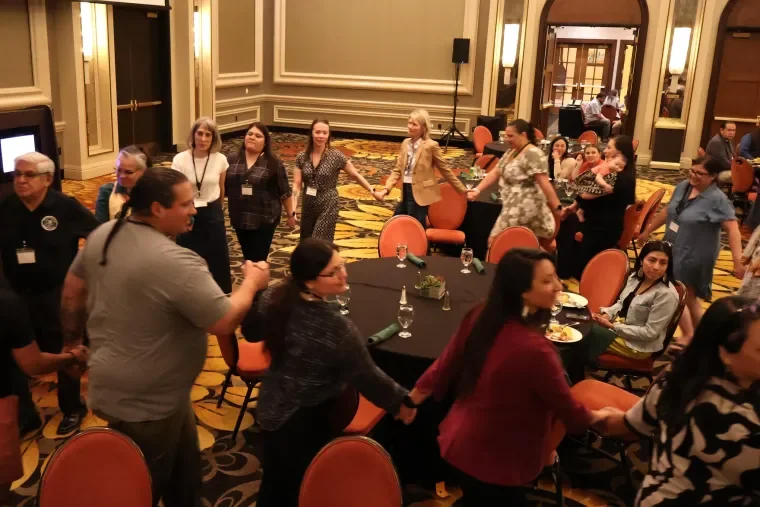
Schedule Overview 2025–26
As an Indigenous Data Champions Fellow, you will be equipped over the course of the 2025-26 year with the knowledge, tools, and perspectives necessary to govern and steward data in ways that align with your community’s culture, values, and interests.
NOV 2025: Fellowship begins
» Orientation materials and agreement.
MONTHLY (DEC 2025 – JUN 2026): Cohort calls
» Peer exchange and discussion on applying IDSov/IDGov in community contexts.
» Ongoing mentorship and check-ins with program leadership.
MONTHLY (DEC 2025 – JUN 2026): Webinars & trainings
Topics may include:
» Foundations of IDSov and IDGov
» Technological infrastructure to support IDSov.
» Environmental sustainability and data governance.
» Data trusts and collective ownership models.
» Artificial intelligence and Indigenous rights.
» Ethical frameworks and community protocols.
APR 15–17, 2026 – U.S. Indigenous Data Sovereignty Network Summit
“Coming Home: Indigenous Data Governance By Us For Us.”
You will attend the U.S. Indigenous Data Sovereignty Network (USIDSN) 2026 IDSov + IDGov Summit hosted April 15-17, on the lands of the Pascua Yaqui Tribe, and within the homelands of the Tohono O’odham Nation, in Tucson, AZ. Fellows will participate in sessions, networking, and share reflections from their fellowship experience.JUN 2026: Fellowship concludes
» Final cohort call and reflection.
» Submission of individual outputs (e.g., case study, webinar, or knowledge-sharing resource).
» Completion of post-fellowship survey and planning for continued engagement with IPDC.
Your input will also be critical to helping shape and optimize the program for future Fellowship cohorts.
APPLICATION MATERIALS
To apply for the 2025-26 Indigenous Data Champions Fellowship, you’ll need to provide application materials. Applicants must submit the following:
-
Name, role, organization, and contact information.
Indigenous affiliation (check box + text entry).
Tribal leadership, staff, nonprofit, or community role status (attest to role and list community/organization)
-
Must speak to your values, work ethic, professional integrity, and commitment to your community (in pdf format)
-
Upload a PDF
-
A letter from a supervisor, mentor, or community leader who can speak to your values, integrity, and commitment to your community; and
A letter of support from Tribal, Alaska Native Corporation, or non-profit leadership.
-
Do you currently work for or fulfill a role as (select one):
Tribal Nation
Alaska Native Regional or Village Corporation
Alaska Native Village government
Alaska Native serving non-profit
Native Hawaiians serving non-profit
Indigenous Island Territories non-profit
Community representative or cultural leader
Name your employer:
Name your role:
Can you commit to attending all the Indigenous Data Champions sessions and the USIDSN Summit during the 2025-2026 year, ending June 30, 2026?
Do you have any accessibility needs, including dependent care, language, mobility, vision, or connectivity?
How familiar are you with Indigenous Data Sovereignty and Governance?
Have you had previous exposure and training to Indigenous Data Sovereignty and Governance? If so, what? Describe any prior exposure or training.
How might Indigenous Data Sovereignty and Governance support your vision for your job and long-term career goals?
What challenges does your community face with data or information, and how could this fellowship help address them?
How will you share what you learn with your community and peers?

EVALUATION CRITERIA
APPLICATIONS WILL BE REVIEWED ON:
Experience, Capacity, & Commitment Relevant experience in governance, data, or community work, combined with the ability to actively participate in the fellowship year.
Collaboration & Knowledge SharingWillingness to learn from others, contribute to peer exchange, and support the collective growth of Indigenous Data Sovereignty through shared resources.
Vision, Impact, & Ethical AlignmentA thoughtful vision for how fellowship participation will create tangible community benefits, alignment with IPDC’s values, and respect for cultural protocols and knowledge protection.
Commitment to IDSov & IDGovDemonstrated interest in or experience with Indigenous Data Sovereignty and Governance principles, and a clear plan for applying these in your own context.
Community Role & RepresentationEvidence that the applicant is working on behalf of their community, including an endorsement or letter of support from Tribal or Indigenous leadership. Regional and cultural diversity will be considered in selecting the cohort.
Meet the Indigenous Data Champions Project Team:

This program is funded by the Henry Luce Foundation.
